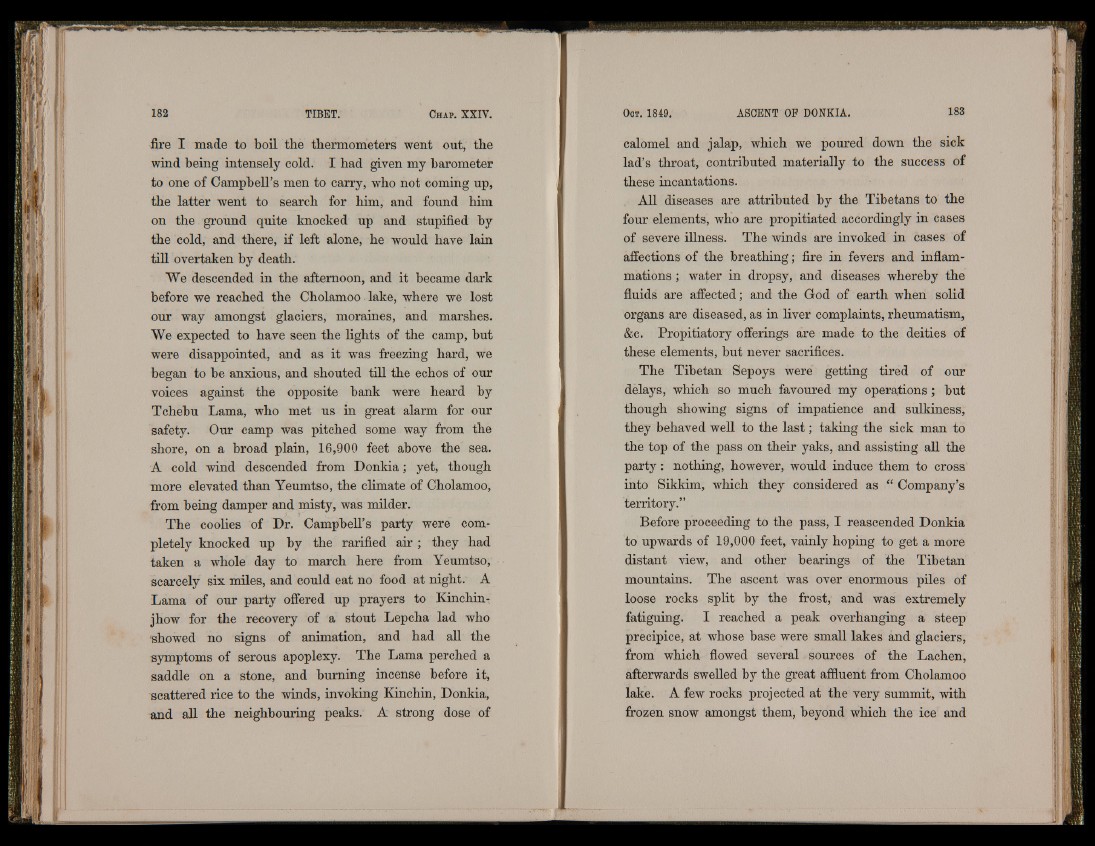
fire I made to boil the thermometers went out, the
wind being intensely cold. I had given my barometer
to one of Campbell’s men to carry, who not coming up,
the latter went to search for him, and found him
on the ground quite knocked up and stupified by
the cold, and there, if left alone, he would have lain
till overtaken by death.
We descended in the afternoon, and it became dark
before we reached the Cholamoo lake, where we lost
our way amongst glaciers, moraines, and marshes.
We expected to have seen the lights of the camp, but
were disappointed, and as it was freezing hard, we
began to be anxious, and shouted till the echos of our
voices against the opposite bank were heard by
Tchebu Lama, who met us in great alarm for our
safety. Our camp was pitched some way from the
shore, on a broad plain, 16,900 feet above the sea.
A cold wind descended from Donkia; yet, though
more elevated than Yeumtso, the climate of Cholamoo,
from being damper and misty, was milder.
The coolies of Dr. Campbell's party were completely
knocked up by the rarified a i r ; they had
taken a whole day to march here from Yeumtso,
scarcely six miles, and eould eat no food at night. A
Lama of our party offered up prayers to Kinchin-
jhow for the recovery of a stout Lepcha lad who
showed no signs of animation, and had all the
symptoms of serous apoplexy. The Lama perched a
saddle on a stone, and burning incense before it,
scattered rice to the winds, invoking Kinchin, Donkia,
and all the neighbouring peaks. A strong dose of
calomel and jalap, which we poured down the sick
lad’s throat, contributed materially to the success of
these incantations.
All diseases are attributed by the Tibetans to the
four elements, who are propitiated accordingly in cases
of severe illness. The winds are invoked in cases of
affections of the breathing ; fire in fevers and inflammations
; water in dropsy, and diseases whereby the
fluids are affected; and the God of earth when solid
organs are diseased, as in liver complaints, rheumatism,
&c. Propitiatory offerings are made to the deities of
these elements, but never sacrifices.
The Tibetan Sepoys were getting tired of our
delays, which so much favoured my operations ; but
though showing signs of impatience and sulkiness,
they behaved well to the last ; taking the sick man to
the top of the pass on their yaks, and assisting all the
party : nothing, however, would induce them to cross
into Sikkim, which they considered as “ Company’s
territory.”
Before proceeding to the pass, I reascended Donkia
to upwards of 19,000 feet, vainly hoping to get a more
distant view, and other bearings of the Tibetan
mountains. The ascent was over enormous piles of
loose rocks split by the frost, and was extremely
fatiguing. I reached a peak overhanging a steep
precipice, at whose base were small lakes and glaciers,
from which flowed several sources of the Lachen,
afterwards swelled by the great affluent from Cholamoo
lake. A few rocks projected at the very summit, with
frozen snow amongst them, beyond which the ice and